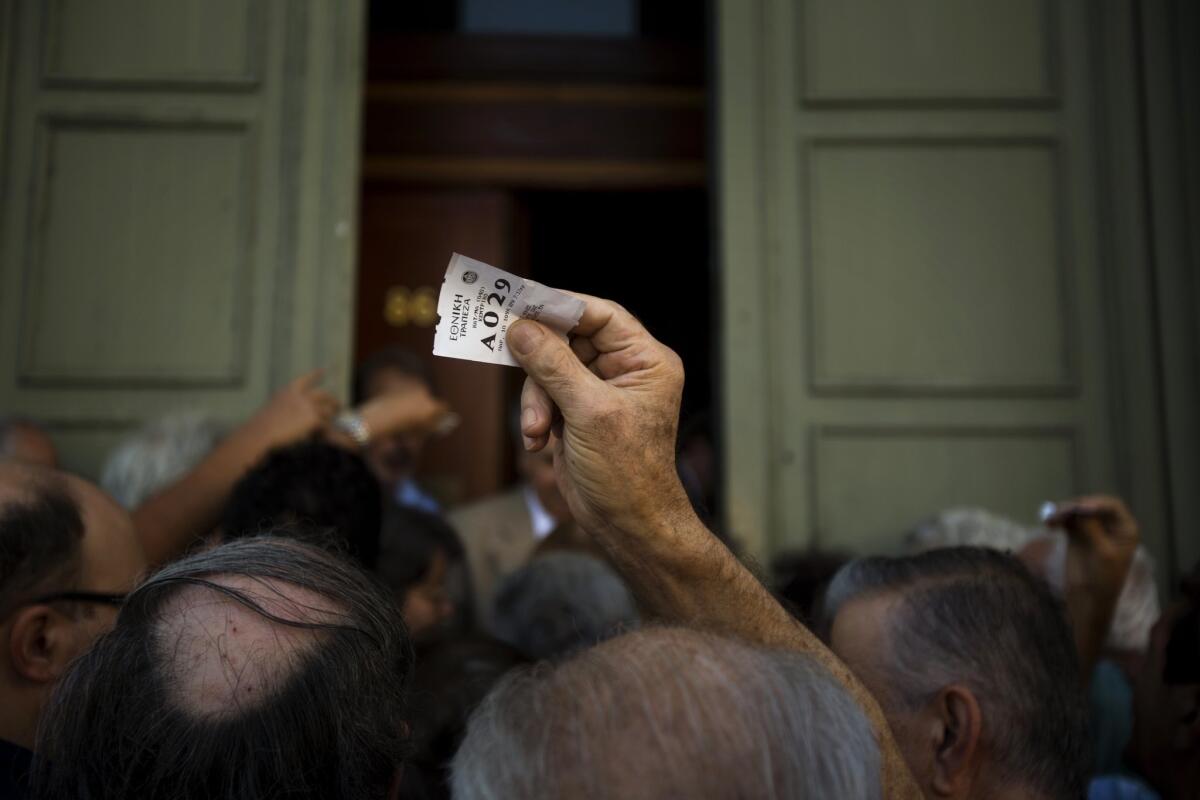Greek lawmakers OK new bailout plan, but split signals more upheaval

A man holds a tag showing his position in line as he waits Friday with other retirees outside the National Bank of Greece in Athens to withdraw funds.
- Share via
Reporting from Athens — Greek Prime Minister Alexis Tsipras on Friday persuaded a majority of lawmakers to back his U-turn with European creditors and give his government the authority to negotiate a third bailout even though it would mean more painful cutbacks and higher taxes.
The parliamentary endorsement of his concessions to lenders on pensions and other help for the poor came early Saturday after a debate on whether Greeks should endure more austerity after six years of eroding social services and vanishing jobs.
Tsipras and his radical-left Syriza party had backed down a day earlier from their steadfast rejection of the terms set by creditors for new loans to avert a banking collapse. The government also wants to open talks on another bailout so Athens can keep up with its massive debt servicing and repayment.
The official count from the 300-seat Parliament’s vote was 251 in favor, 32 against and eight effectively abstaining by voting “present.” Enough of the opposition came from Tsipras’ Syriza colleagues to put the viability of his divided governing coalition in doubt. The defections exposed stark disagreement among the leftists over how much more budget-cutting the country can take and immediately stirred speculation that another leadership upheaval looms in the midst of the financial crisis.
The plan Tsipras was selling — nearly identical to the one rejected by Greek voters in a referendum Sunday — seeks about $60 billion over the next three years in exchange for spending cuts expected to generate $13 billion to keep the creditors at bay and the government solvent. Tsipras sought the endorsement of Parliament, which is dominated by Syriza and its coalition partners, but his seesawing has alienated many within the majority’s ranks.
Tsipras and his coalition partners control 162 of the parliamentary seats, and 15 of them voted against the government’s proposals as a basis for negotiations with the creditors. That suggests that even if a deal can be struck on a new bailout, Tsipras no longer has a majority in Parliament to approve it. Calls for his resignation and new elections or a government of national unity were expected as soon as Monday.
Still, the radically changed posture of the government raised prospects that Athens will be able to reach an agreement with its creditors that will keep Greece in the Eurozone, which sent stock markets surging Friday.
Before the marathon parliamentary session, Tsipras met with the Syriza leadership to discuss the 13-page proposal delivered late Thursday to the International Monetary Fund, the European Central Bank and the European Commission.
Among the new plan’s concessions: an increase in the value-added tax from 13% to 23%; abolishment of special VAT discounts for the tourism-dependent islands in the Aegean Sea; a phased-in increase in the retirement age to 67; immediate incentives to discourage early retirement; a phase-out of preferential tax treatment for farmers; and an increase in the corporate tax rate from 26% to 28%.
At first glance, the proposals seem remarkably similar to the ones rejected by voters in the referendum five days earlier, although small differences are evident. The document includes promises to legislate pension reform by October and a proviso that would allow the government to add compensating measures such as increased tax rates on rental incomes and higher taxes for low-income Greeks, if needed.
Tsipras managed to persuade most of his Cabinet to back the package aimed at securing Greece’s third bailout since 2010. Syriza hard-liners, Energy Minister Panagiotis Lafazanis and the anti-austerity Independent Greeks party refused to endorse the proposals.
Tsipras finessed his about-face, telling Parliament that the resounding “no” vote on the creditors’ offer in Sunday’s referendum was instrumental in getting some relief from the overhanging mountain of debt. The Greek government has proposed, and apparently expects to get, some reduction or rescheduling of the $270 billion already owed the creditors.
“We got a mandate to bring a better deal than the ultimatum that the Eurogroup gave us, but we were certainly not given a mandate to take Greece out of the Eurozone,” Tsipras told lawmakers. “We are all in this together.”
He said Greeks “need to know that from here on in we will be walking through a minefield,” and warned against succumbing to political pressures to drive Greece out of the Eurozone.
Finance Minister Euclid Tsalakotou said Greeks were in a better position after the referendum but warned that “if we do not have a new beginning, a new day on Monday, then we will have a huge problem.”
While the Greek Parliament discussed the plan, a team from the European Central Bank, the European Commission and the International Monetary Fund reviewed it on a technical level. Finance ministers from the 19 nations that use the euro currency will discuss the measures in Brussels on Saturday afternoon, followed by a meeting of leaders from the 28-nation European Union on Sunday.
The finance ministers’ judgment of the proposals -- said to be largely positive by those close to the evaluation -- could determine whether Greece remains in the Eurozone or will become the first member to leave it.
French President Francois Hollande, who has been sympathetic to Greece’s efforts, said the new plan was “serious and credible.”
German politicians struck more skeptical notes. Chancellor Angela Merkel reiterated her opposition to debt forgiveness, pressing Greece to abide by the austerity-driven formula its European colleagues have established as a path to financial stability.
Alexander Graf Lambsdorff, vice president of the European Parliament and a member of Germany’s liberal party, told broadcaster ZDF that it would be difficult for Tsipras to remain credible, given that 61% of the Greek public turned down a similar austerity program in the referendum.
Axel Schaefer, a Social Democrat in Chancellor Angela Merkel’s ruling coalition, was more cautiously optimistic. He called the reforms important, and said he believed a majority of the German parliament would vote for a third bailout.
Though the reaction Friday on the streets of Athens was muted, some Greeks who said they voted “no” in the referendum expressed frustration.
“I’m exasperated. If this was going to be the end result, why did [Tsipras] wait five months?” said Yiorgos Teneketzis, 42, the owner of a retail shop selling high-end security doors.
An online blog, newsbomb.gr, blared a similar sentiment across its home page Friday: “You voted ‘no’ in the referendum? Think again.”
Special correspondent Tsiantar reported from Athens and Times staff writer Williams from Los Angeles.
Twitter: @cjwilliamslat
More to Read
Sign up for Essential California
The most important California stories and recommendations in your inbox every morning.
You may occasionally receive promotional content from the Los Angeles Times.














